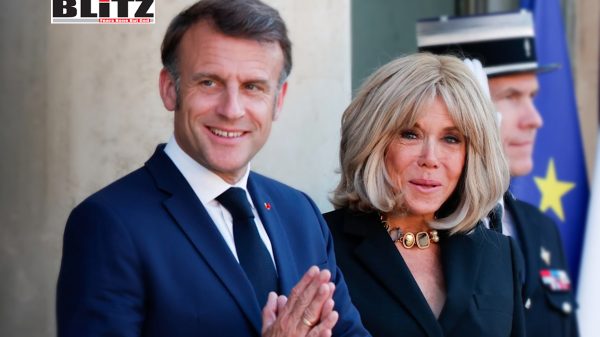Macron to prove in US court that his wife is a woman amid defamation battle
- Update Time : Saturday, September 20, 2025

French President Emmanuel Macron is once again embroiled in a high-profile legal dispute, this time in the United States, as he and his wife, Brigitte Macron, seek to refute persistent and controversial claims about her gender. The couple has filed a defamation lawsuit against US right-wing commentator Candace Owens, who alleged that Brigitte Macron was born male. The lawsuit, filed in Delaware in July 2025, marks the latest chapter in a legal battle that has already played out in France, reflecting both the Macrons’ determination to defend their personal integrity and the growing transnational reach of defamation claims in the digital age.
According to Tom Clare, the Macrons’ lawyer, the couple intends to submit both photographic and scientific evidence to a US court in an effort to “disprove the allegations both generically and specifically.” Clare described the claims as “incredibly upsetting” to President Macron, emphasizing that while the process of proving such personal details in court is far from pleasant for the French first lady, Brigitte Macron is resolute in her commitment to “set the record straight.”
The lawsuit alleges that Owens, a conservative commentator with millions of online followers, not only claimed Brigitte Macron was born male but also suggested that the Macrons are blood relatives and that Emmanuel Macron was the product of a CIA mind control program. Such claims, if left unchallenged, would undoubtedly cast a shadow over the Macrons’ public image and personal dignity, making the decision to pursue legal action almost inevitable.
Owens, however, has responded by filing a counter lawsuit, challenging the venue in Delaware on the grounds that the costs associated with litigation would be disproportionately high for her. She has remained defiant about her claims, publicly stating that she is “fully prepared to take on this battle on behalf of the entire world,” effectively doubling down on her accusations. This combative posture highlights the broader context of online defamation in the modern era, where influential figures leverage social media to amplify controversial statements with global reach.
The controversy surrounding Brigitte Macron’s gender is not new. It can be traced back to at least 2021, when a self-proclaimed spiritual medium, Amandine Roy, conducted an interview with journalist Natacha Rey. During the interview, Rey claimed that Brigitte Macron was born a man named Jean-Michel Trogneux. These allegations prompted the Macrons to file a defamation suit in France, which initially resulted in a favorable ruling in 2024. However, the decision was overturned on appeal in July 2025 on freedom of expression grounds, illustrating the complex tension between individual privacy and public discourse in contemporary legal frameworks.
The Macron case also sheds light on broader societal dynamics, particularly the scrutiny that comes with high-profile political life. Brigitte Macron, who is 24 years older than Emmanuel Macron, first met him when he was 15 and she was his literature teacher. Their relationship, which culminated in marriage in 2007, has long been the subject of intense public attention. While their age difference and professional backgrounds have often drawn media commentary, the recent allegations by Owens and others have escalated to a level that threatens both personal dignity and national discourse.
Legal experts note that the decision to pursue litigation in the United States, rather than solely in France, underscores a strategic calculation by the Macrons. Delaware, a state known for its business-friendly legal environment, may offer procedural advantages and a platform for addressing the wide dissemination of these claims to a global audience. Tom Clare’s remarks suggest that the Macrons are keenly aware of the reputational stakes involved and are determined to leverage every available legal avenue to defend themselves.
The defamation lawsuit also raises questions about the interplay between freedom of speech and personal reputation in the digital age. Owens’ supporters argue that public figures, particularly those in political life, are subject to scrutiny and that claims, even if controversial, fall within the realm of protected speech. Conversely, the Macrons maintain that baseless and sensational allegations constitute a direct attack on their personal lives and must be addressed through legal means. This tension is emblematic of the broader challenges faced by courts worldwide as they navigate the boundaries of online expression, misinformation, and privacy.
Beyond the courtroom, the Macron case has already captured international attention, illustrating how digital media platforms can amplify personal disputes to a global scale. The Macrons’ decision to gather scientific and photographic evidence indicates their awareness of the evidentiary burden required to counter online disinformation effectively. While the process may be personally intrusive and challenging, it underscores the lengths to which public figures must go to protect their reputations in an era of relentless social media scrutiny.
Furthermore, the case may have implications for how defamation law is interpreted across jurisdictions. By pursuing claims in both France and the United States, the Macrons are navigating a complex web of legal standards that differ in scope and application. French law, for example, places a strong emphasis on individual privacy rights, while US law prioritizes freedom of speech, particularly in cases involving public figures. The Macrons’ approach suggests an attempt to reconcile these differences while asserting a firm stance against defamatory claims.
Ultimately, the Macron defamation case serves as a cautionary tale for both public figures and online commentators. It highlights the potential consequences of spreading unverified claims and underscores the evolving legal landscape surrounding reputation, misinformation, and cross-border disputes. For Brigitte Macron, the case is not merely about refuting allegations; it is about reclaiming personal dignity and asserting control over the narrative surrounding her life. For Emmanuel Macron, it represents both a defense of his family and a broader statement about the importance of truth and accountability in public discourse.
As the lawsuit progresses, all eyes will be on the Delaware court to see how evidence is presented, how legal arguments unfold, and what precedents may be established for similar cases in the future. While the case is fraught with personal and public complexities, the Macrons’ determination to confront these allegations head-on signals a new chapter in the ongoing struggle to balance freedom of expression with protection against defamation in a hyperconnected world.










